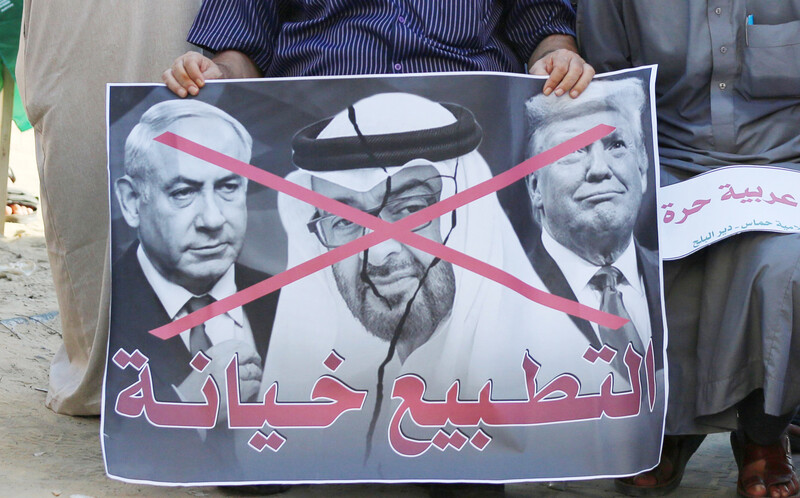Activism and BDS Beat 19 August 2020

Palestinians take part in a protest against the formalization of relations between the United Arab Emirates and Israel, in Deir al-Balah in central Gaza on 16 August.
APA imagesAfter the United Arab Emirates, Sudan is signaling that it may be moving towards formal relations with Israel.
Foreign ministry spokesperson Haidar Badawi Sadiq told Sky News Arabia that “there is no reason for the hostility to continue between Sudan and Israel.”
Sudan’s foreign minister later distanced himself from that statement, according to Israeli media:
But despite any such denial, Sudan’s transitional government has already been in the same race with certain Gulf states to embrace Israel.The head of the government, Abdel Fattah al-Burhan, met with Prime Minister Benjamin Netanyahu in Uganda earlier this year.
Covert relations between Israel and Sudan can be traced back to the 1950s, as Columbia University professor Joseph Massad has noted.
The Sudanese foreign ministry spokesperson said the UAE’s US-brokered “peace” agreement with Israel paves the way for other countries.
He added that the ministry “does not deny the existence of communication between the two countries.”
Netanyahu welcomed the ministry’s statement.
“We will do everything to make this vision a reality,” the Israeli leader said Tuesday.
Israel’s Arabic-language propaganda Twitter account also celebrated the Sudanese spokesperson’s remarks:Mossad chief in UAE
In the first public visit since the announcement of the agreement, Mossad chief Yossi Cohen visited the UAE on Tuesday.
He was greeted by Tahnoun bin Mohammed Al Nahyan, the national security adviser of the UAE and the son of the country’s founder.
While Arab states race into Israel’s arms, civil society groups and unions in the Gulf and North African countries are reaffirming their opposition to normalizing relations.
The Gulf Coalition Against Normalization condemned the deal on 15 August, saying it “went beyond normalization into an alliance with the Zionist enemy.”
The coalition said the deal would not “deter the people of the Gulf from standing with Palestinian rights” – which the group called the “forcibly silent majority.”
It called on citizens “to stand against Gulf normalization at all levels and publicly denounce it and reject all justifications for it.”
Bahrain
The Bahraini Society Against Normalization with the Zionist Enemy called on the Bahraini government to take a firm position against normalization.
A coalition of eight parties in Bahrain also demanded that the government not open ties with Israel.Steps towards recognizing Israel “have always increased its arrogance and aggression against Palestinians,” the parties stated on Friday.
They called on Bahrain’s government to affirm its rejection of normalization in line with the popular position of the country’s citizens.
Signatories include Islamist and progressive political parties.
Kuwait
Trade unions and student groups made similar statements in Kuwait.
Fourteen student groups, including the university student union, issued a call on the country’s parliament to outlaw normalization with Israel.
And 37 members of Kuwait’s 65-seat National Assembly signed a letter reaffirming their opposition to ties with Israel. “The public will not accept any retreat from the government’s commitment to the primary Arab and Muslim cause,” the lawmakers said.“The crimes of the occupation cannot be removed from the souls of our people.”
Kuwait has long resisted the trend towards normalization with Israel pursued by its Gulf neighbors.
Qatar
Meanwhile, the activist group Qatar Youth Opposed to Normalization called for a unified position in light of the UAE agreement with Israel, despite the regional isolation and blockade of Qatar.
That blockade began in June 2017 and is led by regional rivals Saudi Arabia and the United Arab Emirates.
“We are aware of the existence of a silent majority that rejects this humiliation and disgrace,” the group stated on Tuesday.
The group reaffirmed that “attacking Palestine means attacking Arab existence, and defending it means defending that very existence.”
Meanwhile, activists, intellectuals and cultural figures across the Gulf have also expressed their rejection of the deal:





Comments
Normalization
Permalink Frank Dallas replied on
All to the good but the campaign needs to be strong and vociferous in Europe and the US. The public know nothing. The media play the power game. The reporting of the rapprochement between the UAE and Israel has been treated as positive, with Palestine's opposition an afterthought. Nor has there been any mention of resistance in the Gulf State. The media are as slavish, sycophantic, conformist, pusillanimous, careerist and mendacious as ever. It has simply not been pointed out that the motivation of this move is US power. Peace is painted on the 737 and the media accept it. No, this is more likely to herald conflict. The route to peace is justice, equality, democracy, human rights. This is supping with devil with the shortest possible spoon. The UAE glistens with lucre and stinks with injustice, brutality and hypocrisy. The US doctrinal system functions as usual: the pretence of democracy and the reality of the morality of the gun barrel. The injustice inflicted on the Palestinians is not only the most serious matter in the region, it is arguably to most urgent moral crisis in the world. Yet what we see is the Palestinians trodden underfoot on the tarmac of Tel Aviv airport while an empty-headed purveyor of his father-in-law's bigoted, illiterate, morally degenerate doctrine of money and power smiles and witters witlessly, thoroughly bereft of self-awareness and incapable of objectivity. There is madness in it and it can't come to good. A revolt against its revolting slick dishonesty is required, especially in the US. Peace will come only when Palestine is free. Read Tawfiq Zayad. The Palestinians will never relent. Nor will we.